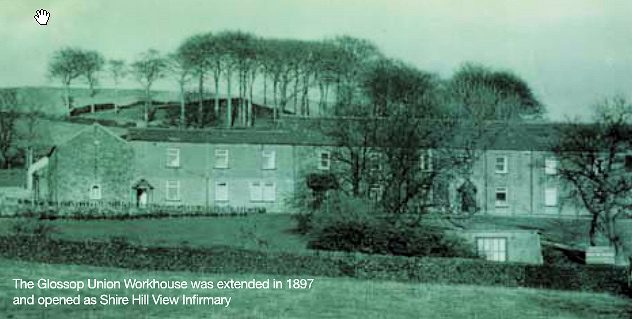A two-storey Township Workhouse was built between 1832 and 1834 on Bute Street (grid reference SK043952). Its administration was taken over by Glossop Poor Law Union in December 1837. The workhouse buildings included a 40-bed infirmary, piggeries, and casual wards for vagrants. The workhouse later became Glossop Public Assistance Institution and from 1948 the N.H.S. Shire Hill Hospital
Up to 1834
Glossop Township workhouse was erected in 1832-4, just before the passing of the 1834 Poor Law Amendment Act. Poor law administration at that time was in the hands of the Vestry meeting which, in January 1833, accepted specifications and plans for the building of a workhouse and invited tenders for its construction.
On 20th February 1834 the Vestry ordered that:a governor of the workhouse be advertised for with notice that his duties must embrace the management of the Poor House, the collection of the rates, and the general discharge of the duties of the Overseer of the Poor.
The salary, with maintenance and residence in the home, not to exceed £50 per annum. The applicant must be a married man of mature age without family, and be able to produce the most satisfactory testimony of his ability and character.
After 1834
Glossop Poor Law Union formally came into existence on 5th December 1837. Its operation was overseen by an elected Board of Guardians, 16 in number, representing its 2 constituent parishes as listed below (figures in brackets indicate numbers of Guardians if more than one):
County of Derby: Glossop, including Glossop Dale, Charlesworth Churnal, Hadfield and Dinting, Padfield, Simondley, and Whitfield (14); Ludworth and Chisworth (2).
The population falling within the Union at the 1831 census had been 9,631. The average annual poor-rate expenditure for the period 1836-38 had been £1,075 or 2s.3d. per head of the population.
The new Glossop Board of Guardians took over the recently built Township workhouse whose location and layout can be seen on the 1919 map on the right.
Staff and Inmates
Records
-
Derbyshire Record Office, New Street, Matlock, Derbyshire. Virtually no local records survive.


The above information was taken from a page on Peter Higginbotham's website with his kind permission
His website provides valuable information about workhouses and is well worth a visit.
He has written several books on the subject that are interesting for general reading and serious research
The following information ( permision applied for) has been taken from an exellent book called "Roses in December" which is about memories of Glossopdale and Longdendale by Mollie Carney and published by Churnet Valley Books




 c1897
c1897 c1927
c1927 Complex from OS Map c1900
Complex from OS Map c1900 Hammer used at Workhouse
Hammer used at Workhouse Shire Hill Hostpital Lodge
Shire Hill Hostpital Lodge Women Inmates in Uniform
Women Inmates in Uniform Workhouse Infirmary
Workhouse Infirmary Workhouse Laundry
Workhouse Laundry Workhouse Staff Cotages
Workhouse Staff Cotages Workhouse
Workhouse